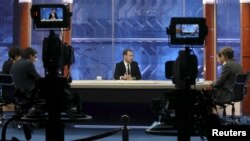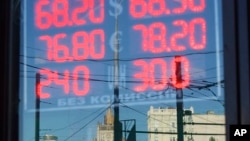Russian economists have slammed Prime Minister Dmitry Medvedev’s optimistic outlook on his country's economy.
In a group interview with five Russian television channels Wednesday, Medvedev claimed Russia’s economy was no longer receding and, by his estimation, would begin growing in 2016.
“Based on the data that are available to the government, I can tell you that the downturn in the economy and production has been stopped,” he said, “and we believe that growth will resume next year.”
Russian economists, however, described Medvedev’s assessment as having little grasp of economic reality and being overly optimistic in forecasting growth.
“All the authorities in Russia have raised their voices and said that the GDP (gross domestic product) will still be shrinking,” said Andrei Movchan, director of the Economic Policy Program at the Carnegie Moscow Center. “The Ministry of Finance was talking about -1.5 percent; the Central Bank was talking about -1.5 percent, at least; a few other personalities and authorities were talking about even worse figures, like -2, -2.5 percent.”
The Russian prime minister acknowledged that other authorities disagreed with him, including Russia’s Central Bank, which projects no growth until 2017. But he still tried to paint a more positive outlook, saying “under the most pessimistic forecasts we’ll have zero growth.”
Seen as out of touch
Movchan told VOA that the prime minister and president often contradict statements made by their subordinates. “I think either the prime minister knows something else nobody else is knowing or he is just not that competent on the issue,” he said.
Russia’s economy is suffering as a result of its dependence on raw material exports like oil, with oil prices at their lowest point in seven years, as well as Western sanctions over the Kremlin’s actions in Ukraine.
There has been a slight reduction in how quickly Russia’s economy has been contracting, but it is still expected to shrink by at least 4 percent this year.
Nonetheless, Medvedev credited his government’s anti-crisis plan with turning the economy around. “I can say that the anti-crisis plan delivered on its objectives,” he said. “This has helped us weather the most difficult period this year, and this plan has succeeded in nearly all spheres that we identified as being of the utmost importance.”
Igor Nikolayev, director of strategic analysis at the Moscow-based audit consulting company FBK, disputes Medvedev's claim. “I see that the anti-crisis plan has not worked, the economy continues to be in crisis and, in reality, we won't have economic growth next year,” he told VOA. “No 1.7 percent growth envisaged next year, but a decline by probably 2-3 percent.”
Medvedev said if there is no economic growth, the government will extend anti-crisis measures as needed. He said his economic outlook could also change if oil prices continued to drop. Prices have dropped to below $40 a barrel, the lowest since 2009.
Critics have long chided Russian authorities for doing little to end the country's economic dependence on energy exports. “The most important peculiarity of the present crisis that Russia is living through is that without the fall in oil prices, and without the sanctions, the Russian economy would have gotten into a crisis anyway, because serious structural disproportions and structural problems have accumulated,” Nikolayev said.
The prime minister acknowledged that oil still accounts for 44 percent of Russia’s federal budget, but said its importance is changing. “Oil used to account for 50, 60 and even 70 percent of the budget revenue,” Medvedev said. “This goes to say that our budget revenue structure is changing for the better.”
Sinking living standards
He said the government’s key priority was to prevent a decline in Russian living standards, and that it is up to the people to decide if it has succeeded or not. He touted measures such as indexing pensions to adjust for inflation.
November's inflation rate was 15 percent, but the prime minister noted it was slowing and said it was realistic to project inflation dropping to 6.4 percent in 2016.
Regardless, Movchan said living standards have been declining and will continue to drop. “The level of salaries dropped dramatically and the indexation of salaries and pensions would not come in 2016 at levels comparable to the levels of inflation and the loss of the purchasing power of the ruble. With that regard, the consumption will fall even more."
Despite concerns that consumer prices, already up thanks to Russian counter-sanctions targeting Western food imports, may continue to rise, Medvedev defended a ban on Turkish fruits and vegetables set to go into effect in January.
“I’m not going to contest the fact that counter-sanctions affect prices to a certain extent. But this impact is not fatal,” he said. “We have started to forget that food price inflation in early 2008 was 13 percent, you can look it up. And in early 2015 it remained at a similar level.”
The sanctions were announced after a Turkish jet shot down a Russian warplane along its border with Syria for allegedly crossing into Turkish airspace despite repeated warnings. Russia denies the Su-24 crossed the border and called the action a planned provocation.
Medvedev said Russia could have justifiably gone to war with Turkey: “How did states normally behave in a situation like this in the 20th century? A war started, because this amounts to a direct attack on a foreign state.”
The prime minister added: “Naturally, in our present life, under current circumstances, a war is the worst option.”





